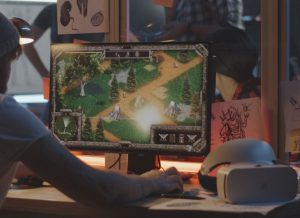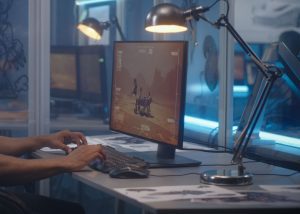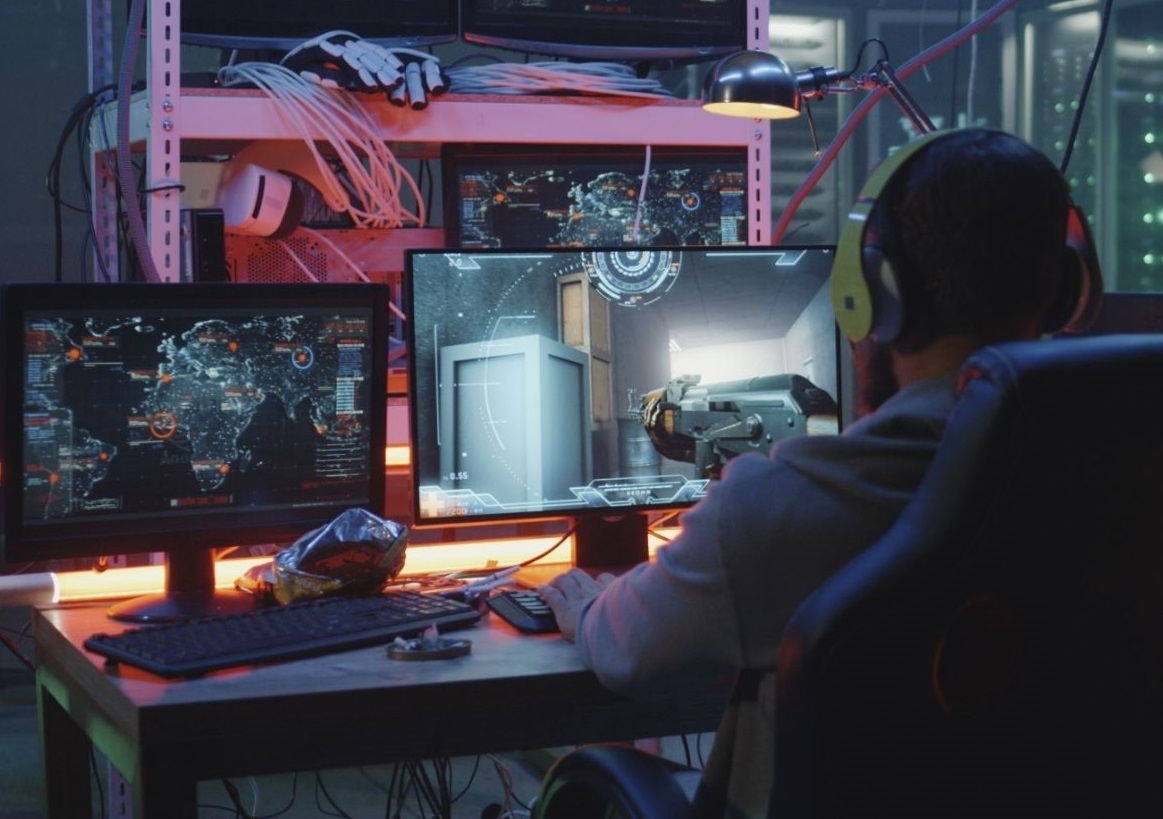What Are the Main Types of Game Designers?
To become a game designer requires creativity, technology skills, and education. The work of game designers is crucial to video games. They are the ones who come up with the ideas, create the game’s mechanics, and help design the player experience. To become a game designer, you collaborate with developers, artists and other team members to make their ideas realities. Depending on the aspects of game design they focus on, there are several types of game designers.
- Level Designer: Designers of individual levels or stages of the game, level designers lay out the spatial arrangement, challenges and puzzles within each level. They set up the context in which the player will play and ensure that it meshes well with the context of other levels and the game.
- System Designer: The system designers are responsible for the game’s underlying mechanics. They create the rules, interactions and systems that control how your game works. This can include combat systems, economy systems, progression mechanics, etc.
- Narrative designer: People who work on the storytelling aspect of the game. They create the plot, characters, dialogue and world-building elements.
- UI/UX Designer: User interface (UI) and user experience (UX) designers are responsible for ensuring that the game works well and is easy to use and interact with. UI/UX designers are responsible for all of the menus, heads-up displays (HUDs), which are on-screen messages that keep track of certain things (like the ammo in your gun in first-person shooter games or your health in role-playing games), and other on-screen elements that are used to control the game.
- Gameplay Designer: Gameplay designers are responsible for defining the core of the gameplay experience, making sure it’s fun, well-balanced and challenging. They design and tune features such as movement, combat, puzzles and interactions between the player and the game world. Technical Liaison between the design and development team. Responsible for bridging the gap between what the designer wants and the programmer can do. Excellent grasp of game design and the ability to program to make developer’s jobs more accessible by creating tools and features.
- Sound Designer: A sound designer creates and applies all the audio in a game, including sound effects, voices and music, in close collaboration with the game’s design team to ensure that the audio matches the gameplay and adds value to the experience.
- Monetisation designer: Develops systems for the game to earn money, particularly in free-to-play games. Designing in-game purchases, rewards and other mechanics to encourage players to spend while not detracting from the game experience.
- Lead Designer: Responsible for the vision and design direction of a game and for managing the design team, the lead designer ensures that the various aspects of the game’s design come together coherently to meet the project’s goals.
- Combat Designer: You’ll be creating the combat systems and mechanics, like enemy behaviour traits and combat encounters, and you’ll also be balancing the difficulty of the combat system.

What Does a Game Designer Do?
To become a game designer refers to a person who composes and plays video games like Donkey Kong, Mario Odyssey, Minecraft or Angry Birds. In the video game industry, a game designer works collaboratively with other artists, programmers and sound designers. What exactly does a game designer do? Let’s break it down:
- Create Game Concepts: To become a game designer, you are responsible for crafting the ideas and concepts of a game, such as what the game will be about, where the game will take place, who will be the characters, and what their goals will be. These ideas are generally what the game is initially based on.
- Design Game Mechanics: The game’s mechanics – how the player can move around in the world, how they can attack and defend, and what obstacles they need to overcome – are the most fundamental part of the design process.
- Design Levels and Worlds: Designers at this level craft a game’s environments and levels: the layout of each area, the placement of obstacles and challenges, whether it’s an open or closed space, and how the player will move through the world.
- Write Storylines and Dialogue: Narrative designers work on writing the story of the game, including dialogue, characters and plot. They ensure the story is well-written and engaging and integrates with gameplay in a way that pulls the player into the gaming world.
- Collaborate with other teams: To become a game designer, you have to work with artists, programmers, sound designers, and other developers to make sure all the different components of the game work seamlessly. Designers explain the game’s vision and ensure that what other departments do follows the game design.
- Playtest and iterate: Playtesting is integral to the game design process. Designers often play the game to identify problems, like bugs or mechanics that aren’t balanced or segments of the game where the fun isn’t there. They take observations and feedback about what isn’t working and iterate on the design.
- Balance in Gameplay: Balance in a game is necessary to make it difficult but fair, and this means that a designer will need to balance difficulty, tweak player abilities and tinker with rules so that players feel rewarded adequately without becoming frustrated.
- Make Game Prototypes: Before creating complete builds, designers usually make prototypes of the game or specific mechanics to test ideas and get early feedback on whether the gameplay is fun and engaging.
- Design Docs: To become a game designer, you write design documents that detail everything in a game, from its mechanics and levels to its characters and narrative. These documents are a roadmap for the rest of the team, who need to know exactly what the designers want to be sure they deliver the desired output.

Average Game Designer Salary
The salary of a game designer in the UK depends upon the designer’s experience, the studio’s size and the person’s role in the development process. Here is an overview of average game designer salaries.
- Entry-Level Game Designer: £20,000 to £30,000 per annum. Entry-level game designers are just starting in the game industry. They’re often graduates or people with little to no experience in the industry. They’ll usually enter a junior role and assist in tasks like level design or documentation for senior designers.
- Mid-Level Game Designer: To become a game designer with a few years of experience can earn approximately £30,000 to £45,000 a year. The mid-level designer could be trusted to take ownership of a particular game feature or level and work more autonomously.
- Senior Game Designer: £45,000-£70,000 per year Senior game designers, who often lead larger teams or an entire project, may earn in this bracket. They usually have several titles under their belt and are instrumental in defining a game’s macro design direction.
- Lead Designer: Manages the team of designers, as well as the overall vision of the game. Can earn £60,000-£100,000 or more depending on the studio and scope of the project.
- Freelance Game Designer: The rate of a freelance game designer depends on the type of game design and the person’s experience, but it is usually an hourly rate, so it can vary from project to project and client to client. Earning from freelancing is usually between £25-£60 per hour.
Game Designer Skills
A lot of creativity is involved in becoming a successful game designer, as well as technical knowledge and teamwork skills. As a game designer, you need to be able to come up with ideas for interesting game experiences and then collaborate with a large and varied team to bring those ideas to life. Here are the essential skills that a game designer needs:
- Creativity and Imagination: To become a game designer, you have to develop novel ideas and concepts. Players must be able to imagine engaging with the game world, so the game designer must create interesting things to engage the player’s imagination. This could be novel game mechanics, personalities for fictional characters, or aesthetics that make the world immersive and appealing.
- Problem-Solving Skills: To become a game designer, you frequently work on problems with no obvious solution: how to balance the difficulty of gameplay, fix bugs, or design levels that push players to their limits without pushing them over the edge. A strong problem-solving skillset will be vital in overcoming these problems.
- Technical knowledge: You must be an expert programmer to be a good game designer, but you need some technical knowledge. Even entry-level positions require a basic understanding of programming languages and game engines such as Unity or Unreal Engine. Larger companies often use proprietary tools, so it helps to know about common development tools such as Perforce (a version-control system) and Jira (a bug-tracking system).
- Collaboration and Communication: Developing a game is a very collaborative process that involves working with many different people. Designers must communicate with artists, programmers, writers and sound designers, use clear language to convey ideas and ensure the game’s vision is relatively consistent across all departments.
- Attention to detail: To become a game designer, you must keep your attention firmly on details, from the mechanical feel of the gameplay to the level design, as it affects your aesthetic sensibilities. Little details can have a big impact on your audience’s experience.
- Storytelling Skills: Designers working on narrative-driven games (such as Telltale’s The Walking Dead) need strong storytelling skills to make gameplay engaging. This involves creating interesting characters, plots and dialogue that don’t get in the way of gameplay.
- Flexibility and Adaptability: Game development is ever-changing, and designers need to be able to shift their designs based on feedback from playtesters, developers and producers.
- Gaming Obsession: This point could be argued to be the most important. A great game designer must truly love games and understand how and why they work. If they are playing a lot of different kinds of games, genres, mechanics, and design trends, they’ll be better-informed designers when they come to make their own.
- Time management: To become a game designer, you often work to a tight deadline; this requires effective time management and the ability to manage and prioritise tasks to ensure all game components are created to the agreed deadlines.

Game Designer Tips
Below are some suggestions for aspiring game designers looking to break into the industry:
- Play as many different types of games as possible: To become a game designer, you must be a player as well – a well-rounded player who can discern what works, what does not, and how design choices affect a player’s experience. To have a well-balanced and critical eye, you should play as many different types of games as possible, and you’ll gain a sense of what you prefer and what resonates with you. You’ll draw from your experiences and explore what you like about different styles and mechanics. You’ll be hungry to put your spin on what you enjoy and what you’d like to improve.
- Get Small And Build A Portfolio: Make some small games to build your portfolio. This could be prototypes, you could make mods, or maybe you want to make something in Unity or Unreal Engine, but it’s really small. Employers will want to see things you’ve made; the more you can show them, the better.
- Get to Know Game Design Tools: Familiarise yourself with the various game design tools out there, such as Unity or Unreal Engine, as well as the design and creation software at your disposal, such as Blender, Photoshop or GameMaker Studio.
- Attend Game Jams: Attending game jams, where developers create games in a short period, will teach you many new skills, not least how to work under pressure, as well as giving you a chance to meet other designers and developers.
- Learn Game Design Theory: Read up on game design principles. Books such as The Art of Game Design: A Book of Lenses by Jesse Schell or Rules of Play by Katie Salen and Eric Zimmerman will improve your understanding of what makes for a good game.
- Get Feedback and Iterate: When making games, find players, peers or mentors to give you feedback. Iterate your designs based on this feedback. The truth is that making games (like many creative endeavours) is a process of iteration. Learning how to take constructive criticism is important.
- Network through the Industry: To become a game designer, the most valuable thing you can do to get into the industry is to network. Get out to gaming conferences, industry panels and developer meetups. Meeting other professionals in the industry will get your foot in the door and help you find a job.
- Work with Other Creators: To become a game designer is a collaborative process, so work on projects with others who are interested in making games: other designers, artists and developers. Collaboration will improve your skills and prepare you to work on larger teams later.
- Keep up with industrial trends: The gaming industry is always evolving, so keep up with the latest trends in game design, technology and player preferences. Read industry news, play new games and participate in forums.
- Practice, Practice, Practice: Game design is a craft, which means you’ll become better at it with more experience. Simply designing games will help you hone your abilities to make games fun and engaging. Experiment with different ideas, mechanics and genres to continually expand your toolset.

Game Designer Requirements
To become a game designer requires creativity, technology skills, and education. In this essay, I will show the typical requirements to start your career as a game designer.
That game design is for those interested in technology and with creative minds. Being a game designer means you must have basic technology and graphic design knowledge, which are very important aspects of this career.
For example, if you want to create a mobile game, you must use Unity 2D or 3D software. However, this means that you need creativity to get the idea for the game and good computer skills to make it work.
You must study or do courses to learn these technologies and have a creative mind. This is how people start their careers as game designers.
Some people can start as a game design intern to acquire the experience first. However, most companies ask for a degree in computer science or a similar field. Here’s an overview of the typical requirements to start your career as a game designer:
- Relevant Education: While having a game design degree is not necessarily required, many game designers have degrees in game design, computer science, graphic design, or something related. Some universities have game design specialisations; others have more general programs for interactive media or software development.
- Game Design Portfolio: You’re going to want to have a decent portfolio to demonstrate your games. Your best bet is to have a few completed projects demonstrating your skills. Whether it’s a prototype, a mod or a full game, you should be able to enter an interview with a name and a link your interviewer can check out. Your portfolio should include details of your role on the project (e.g., designer, programmer, artist), the tools used (e.g., Unreal, Unity, Photoshop, Maya), and what you learned from the experience.
- Technical Skills: Knowledge of programming languages (e.g., C#, C++, JavaScript, etc.), game engines (e.g., Unity, Unreal Engine) and design tools is usually necessary. You don’t need to be a programmer, but the more you know about how games are built, the better designer you’ll be.
- Excellent Communication Skills: To become a game designer, you need to communicate his or her ideas clearly to others on the development team, such as programmers, artists and producers. Good written and verbal communication skills are essential for effective collaboration.
- Problem-Solving and Critical Thinking: Game design is a problem-solving discipline. You must constantly solve problems in the mechanics, balance and play experience. You will also have to spot these problems regularly and solve them as they come up during development.
- Passion For Games: A love of games and a thorough knowledge of the breadth and depth of game genres, devices, and trends is necessary. A passionate designer is likely to create better experiences for the player.

How to Become a Game Designer
Becoming a game designer takes time, imagination and a willingness to learn. This step-by-step guide will help kick-start your game designer career:
- Get a Degree (Optional): Although not necessary, a degree in game design, computer science, or a related field will give you many valuable skills and insights. Many game design programs are project-based, with internships that will help you build your portfolio.
- Create A Portfolio: Start creating your games (either larger projects or just prototypes) and focus on demonstrating a variety of game mechanics and design skills. If you want a job, the goal of your portfolio is to prove that you can create fun, compelling experiences that are unlike anything anyone else can create.
- Learn Game Development Tools: Get comfortable using a game engine like Unity or Unreal Engine. Learn programming languages for game development (C#, C++) to communicate effectively with developers or implement your designs.
- Enter Game Jams: Game jams are a fantastic opportunity to develop your skills, network with other designers, and develop portfolio pieces. In game jams, you and your fellow jammers are given a time limit – often a matter of days or weeks – to develop a concept for a game based on a particular theme. While designing the game, you might modify established design conventions to create something necessarily novel.
- Seek Out Feedback and Iterate: Find opportunities to test and iterate by getting feedback from peers, players and mentors throughout your design process. Through iteration, you will become a better designer.
- Networking: Get to know other game developers by attending conferences, meetups and events. Networking can lead you to paid work collaborations with others, and you’ll learn from designers who’ve been in the industry for a while.
- Apply for an internship or an entry-level job: If you have an impressive portfolio, you can apply for an internship or an entry-level job at a game development studio.
- Keep Learning and Growing: the world of game design is constantly evolving, so you need to stay up to date with industry trends, tools and techniques. Learning is a constant process, and you will always have new things to learn to stay competitive in the job market.
Frequently Asked Questions
Why Should You Become a Game Designer?
By becoming a game designer, you can use your ingenuity, technical know-how, and love of games to earn a living by creating entertaining, innovative, interactive experiences that people worldwide play and appreciate.
Is Being a Game Designer a Good Career Choice for You?
Do you like puzzles, writing stories, and creating interactive experiences? If so, then game design might be the career for you. Game design is great for people who like games and want to create new and exciting gameplay experiences.
Game Designer Salaries
Game designer salaries in the UK typically range from £20,000 to £70,000 or more, depending on experience, location, and studio size. Salaries can be higher for senior designers or those working for large game development companies.
Which Qualifications Can Help with a Career as a Game Designer?
While a degree in game design, computer science or interactive media is useful, it’s not always required. What’s important is the portfolio, which should demonstrate your creativity, technical skill and knowledge of game design.
Do I Need Experience to Get Started as a Game Designer?
No, but you need a portfolio of work. If you’ve never worked in the industry, even a few small games you’ve made, jam games, mods, or whatever, all of that will build up experience and create a portfolio that can lead to a job.
Game Designer Career Outlook
Still, there is a clear need for game designers, given the increase in the gaming industry. There are jobs in small companies (indie games), mobile gaming, VR/AR, and big studios (AAA).
Game Designer Hierarchy and Progressing Within the Role
Like many other professions, game designers usually get their start in junior positions and up to mid-level or senior designer roles. With experience, designers might assume the lead designer role, managing an entire design team and the project’s creative vision.
Game Designer Exit Options and Opportunities
Some designers become game producers, creative directors or UX designers. Some get into teaching and end up lecturing in university game design programs. Others launch their game studios.


